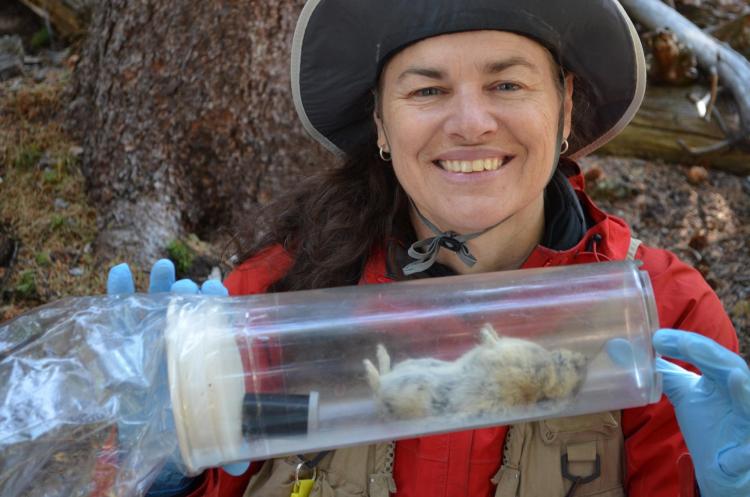CU Boulder pika researcher wins conservation award
A CU Boulder researcher is being recognized by the Denver Zoo for her extensive work studying the pika across the Colorado alpine
Chris Ray, a researcher from the University of Colorado Boulder known for her work with pikas in the Colorado alpine, is this year’s recipient of the Denver Zoological Conservation Award.
This annual award, which comes with a cash prize of $5,000, recognizes an individual who has made a significant contribution to the field of wildlife conservation. For Ray, this impact included working with the Front Range Pika Project, a citizen science project that gathers data on pikas—a small mammal related to the rabbit—in the Rocky Mountains, and studying the vulnerability of pikas around the world.
“I was really surprised,” said Ray, a researcher in the Institute of Arctic and Alpine Research that is also affiliated with the Department of Ecology and Evolutionary Biology at CU Boulder. “It felt so rewarding to feel like these amazing organizations were supporting our research so much that they were willing to give to the cause. It’s really validating to understand that people are behind you that much.”

Chris Ray, seen here handling an unconscious pika, is being recognized for her conservation work. Photograph courtesy of Wolf Perry/H2O Radio.
Ray has been a fundamental part of the Front Range Pika Project since its inception roughly ten years ago. While it is managed jointly by the Denver Zoo and Rocky Mountain Wild, it is built off of Ray’s existing pika research and her ongoing scientific supervision.
An important part of what makes the Front Range Pika Project unique—and one that is critical to its ongoing success—is the inclusion of citizen scientists, or residents in the community who assist in data collection. These volunteers come from across the Denver metropolitan area, Front Range and high country communities, and help to collect data on pikas and their habitats. In 2018 alone, 125 volunteers hiked to more than 100 sites, and managers of the project want to expand it even more next year.
Ray then uses data collected by volunteers to draw conclusions about the state of pika populations across the Rocky Mountains in Colorado. Over the course of her research thus far, she has found that while pikas are faring better in Colorado than in many other places around the globe where they are disappearing, that may not last, as she and her colleagues have predicted local extinctions—or when the species disappears in some areas but not others—connected to a changing climate.
“We admire, appreciate, and thank Dr. Ray for her efforts. Her ability to inspire and train the next generation of wildlife conservationists is motivating—she is a true conservation leader within the community,” the Denver Zoo wrote in a press release.
Ray plans to use the award in two ways: First, she wants to fund a student study of the grasses and flowers that pikas collect, and what impacts a changing climate might have on their quality; and second, she also wants to continue another interest: Pika ecology in Mongolia, where they appear to be in drastic decline in some locations and researchers don’t know why.
“I’m urgently wanting to go back right now while there are still some pikas there,” Ray said. “I want to try to understand what’s going on before I lose that opportunity.”
More information on the Pika Project, including how to get involved, is available on the Pika Partners website.
Top photograph courtesy of Shanthanu Bhardwaj/Flickr.

